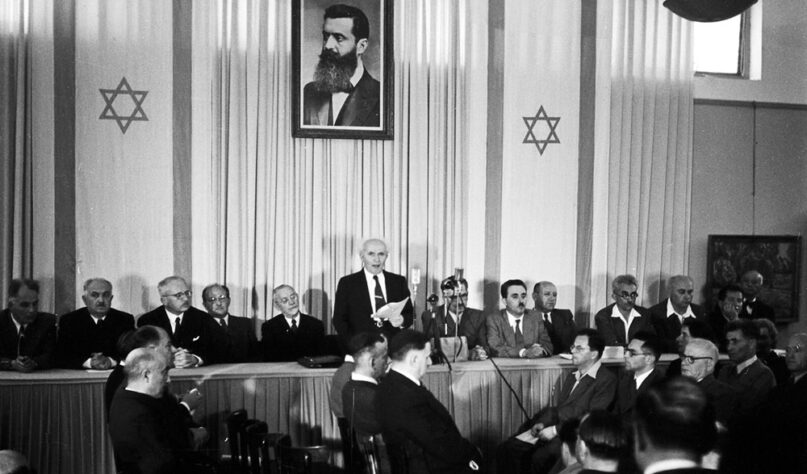
By Donna Robinson Devine
(JNS) Depending on the era, 1948 may have been the best of times or the worst for progressives. Progressives once embraced the Jewish state as a trope for self-sacrifice and solidarity, a testament to the redemption of a bruised and battered people. Progressives now see Israel practicing apartheid, genocide, ethnic cleansing and of sustaining itself as a remnant of an outdated and thoroughly delegitimized colonial order. Today, the old romanticized image of Israel—shaped more by Exodus, the film, than by Exodus, the biblical book—no longer gets much of a hearing. Recall that in the 1950s, the far-left Weavers recorded “Tzena Tzena,” a song celebrating Israeli soldiers and sexual freedom.
The more Israelis put their titanic struggle for safety and security behind them, the more difficult it became for progressives to find resonance in a Jewish state failing to end its conflict with Palestinians. Because the narrative of rebuilding a land through the sweat of the brow and toil of the hand no longer described the country’s map or society, it seemed more a description of the country’s past than of its present. With victimhood now elevated into a necessary, if not, sufficient cause of virtue, the progressive relationship with Israel came into a facile encounter with Palestinians who commanded increasing empathy and attention. In an America seething with anxiety and uncertainty, most progressives are more than willing to replace any past association with Israel with a pronounced hostility to Zionism.
Trying to lend scope, if not comfort, to the position of Jews in the progressive movement and seeking (also and perhaps in vain) to express communal solidarity, some Jewish progressives have recently criticized Israel for its failure to live up to its Zionist ideals. Expanding on this notion, journalist Peter Beinart actually reimagined Israel’s moment of triumph in 1948 as Zionism’s defeat, whose aim for a homeland, he claimed—and presumably for only a homeland—was displaced by the founding of a sovereign state. To propose dismantling any state in the wake of COVID-19 expectations for strict border control as a means of saving lives probably belongs more to the realm of fiction than to utopia. But to argue that Zionism itself provides the reasons for dismantling a Jewish state says more about the identity of Jewish progressives than about how Zionism actually imagined sovereignty.
How credible is it to give new life to the Zionism that had, for one reason or another, reservations about struggling for an actual state? Cultural Zionists cautioned against placing too much emphasis on a “Jewish state, rather than on the state of Jews and of Judaism” in the words of their most eloquent exponent, Ahad Ha’Am, who died in 1927 in a Palestine ruled by Great Britain. Would a cultural Zionism propose dismantling the state that gave Hebrew the resources to become not only a modern literary language, but also the vocabulary for daily life? A reverential esteem for Ahad Ha’Am’s Zionism certainly did not deter Chaim Weizmann from securing global backing for a national home as a predicate for establishing a Jewish state. The very propositions underlying cultural Zionism contributed to the success of establishing the new Jewish state. Reviving the Hebrew language was an instrument to transform a people once defined by their religious traditions and law into a nation bound together by a shared, albeit often newly invented, mores. The creation of a culture whose literature and ideas were expressed in Hebrew, and whose ancient laws and rituals could be translated into national traditions, was the groundwork for a state offering Jews something Zionists believed could be found nowhere else—the opportunity to take advantage of the modern world. The homeland was almost as much about language as about land. It’s difficult to believe that a homeland could generate the same cultural fulfillment as the state has already delivered.
Past efforts to generate a Zionism without Jewish sovereignty offer no reason for optimism that enemies will be transformed into allies. There were Zionist advocates for a binational Palestine, but they never drew Arabs into their movement because both peoples were haunted by Jewish immigration and could not transcend their deep divisions over the issue. To disinter the Zionisms possessing reservations about moving from homeland to state is an interesting intellectual exercise; to deploy them as cudgels against Israel’s identity or independence reflects a deeply problematic use of history.
Imagining a Zionism rejecting even the idea of a Jewish state would have to discount much of the movement’s activities regarding land purchases and immigration. Such a perspective cannot account for the energy and resources invested into setting up an elected assembly called the Asefat Ha-Nivharim, which required serious consideration of an electoral system. Or the National Council, drawn from this assembly, that had authority over matters of social welfare, health, education and religion. The British Mandate, which provided Palestine with a geography and the site for a homeland, supplied the Jews with incentives to consolidate a comprehensive framework to help secure their needs, promote their goals, manage their own affairs—within the limits set by colonial policy—and ultimately project a polity so stable as to be worthy of sovereignty. Building a homeland and constructing a state were activities conducted simultaneously.
Perhaps because Israel was imagined long before it was founded—visions conjured in the religious canon, in surreal fantasies and in political treatises—the country could never be entirely liberated from the idea of Zion, no matter how far it departed from reality. For the standards generated by the Zionist imperatives to build a nation state intended to be both “normal” and “exceptional” encouraged expectations that could not ever be met but could never be totally dismissed. And while the differences could often be hidden in abstractions or ambiguous language, by the same token, they could not be entirely avoided. Never reluctant to champion their ideals, Zionists displayed a remarkable linguistic flexibility, particularly about foundational terms like homeland and state in an effort to radiate a compensatory unity from a diversity of views and goals. The result: even political Zionists known for the sometimes brutal clarity with which they proclaimed their commitment to a Jewish state imagined it not possessing the sovereignty on offer from a Thomas Hobbes.
Even without a clear or single political theory of sovereignty, Jews in Palestine were conscious of participating in a story attracting intense global attention, as well as in a risky political experiment. Zionism gave voice to the power of their imagination not simply to reinterpret history, but more importantly, to change it for the sake of creating a radically different future for themselves and for the Jewish people. Substituting action for prayers gave Zionism its purpose. Work, rather than textual study, would be the vehicle for legitimizing possession, creating community and for transforming sites holy in scripture into a homeland. Zionists were builders empowered less as individuals than as members of a kind of collective construction team. It is not surprising, then, that for Zionism, left and right, 1948 symbolizes both the difficulty of building a promised land and the ease with which it could all be swept away.
Donna Robinson Divine is the Morningstar Family Professor of Jewish Studies and Professor of Government at Emerita Smith College.
PHOTO: Declaration of state
CAP: David Ben-Gurion announces the new State of Israel on May 14, 1948. While the nation does not have a constitution, the Knesset has passed a “Nationality Bill.” Credit: Israel Ministry of Foreign Affairs/Wikimedia Commons.








 Southern New England Jewish Ledger
Southern New England Jewish Ledger









